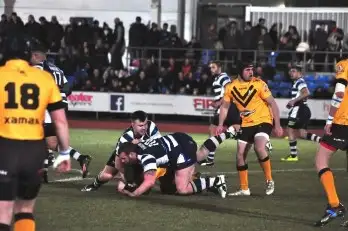Profitable Rangers ready for League 1 step

Manchester Rangers have emerged over the last year or two as new contenders in the world of community rugby league.
Clearly ambitious, rumours circulated that they were ready to replace York City Knights in League 1, when it seemed as though the Yorkshire side would cease to exist, towards the end of 2016.
The club are also ready to make the step up into the ranks of League 1, according to club chairman Phil Fitton.
“We are ready now to take the next step and a full application has been submitted to the RFL to join Kingstone Press League 1,” he told Love Rugby League.
“It was submitted several weeks ago after many months of discussions and we are now waiting to find out if there’s going to be a place for us at some point in the not too distant future.”
Certainly, the Rangers have access to fine facilities, and seem to be a well-managed and resourced club, capable of climbing the pyramid.
For them to be considered true contenders, however, results on the pitch will need to improve, with the club finished seventh in last season’s North West Men’s League Division Two.
For a club that has only been in existence since 2012, though, progress has been rapid indeed.
“When the club was created back in October 2012, we had one aim: to bring professional rugby league back to Manchester after a 60-year absence,” added Fitton.
“And at the same time create a strong rugby league community with the facilities and infrastructure that would be needed.
“We have been successful, and have two teams at Manchester Rangers, as well as a community club the Belle Vue Bees.
“Our home ground is the 6,500 all seater regional arena next to the Etihad Stadium, home of Manchester City. We worked with Manchester City Council for a couple of years proving ourselves before securing Manchester Regional Arena as our home.
“Its exciting to think, thanks to our efforts, you will now see Wigan Warriors play the Toronto Wolfpack in the shadow of Manchester City next month.”
Rangers have been fortunate in that Manchester City Council has been very forthcoming when it comes to offering meaningful support to the club.
Fitton also highlights the way in which his club has partnered with educational authorities, as well as local govermment.
“Manchester City Council have also built the Belle Vue Sports Village which has two 4G Rugby League pitches, this has become the base for our community club Belle Vue Bees,” he explained.
“We’ve have also moved our training base to the Manchester Rugby League Academy at Platt Lane.
“By partnering with Manchester Metropolitan University and Manchester College we have been able to create a unique rugby league academy that will begin in the 2017/2018 academic year.
“Students will complete a sports qualification alongside receiving quality coaching for Rugby League by Manchester Rangers coaches, getting daily training on rugby specific elements, conditioning and competitions in the AOC RFL elite league.
“When the students complete the sport course they can look to apply for a number of different courses at Manchester Metropolitan University which include Coaching and Sports Development, Physiotherapy, Sport and Exercise science, Sports Management and more.”
Crucially, the club also seems able to attract spectators, another advanatage of being located in a huge city, and at a site which has superb public transport links.
“Our attendances have been good,” said Fitton.
“We got our highest gate of 358 last year, and when we hosted the Conference Trophy it got a record crowd of over 1300.
“There is a tram stop directly behind the stadium, we are within walking distance from the city centre, and there is enough parking to cope with a full house at the Etihad.”
The club’s business model is also constructed to ensure that the club remains sustainable at every stage of its progress.
“We have a very strong board of seven directors, made up of business people, sports industry professionals, educational specialists, chartered accountants, legal professionals and marketing specialists,” added Fitton.
“We pride ourselves on having a business model for the club that is self-sustaining, we’ve made a small profit in each of our seasons to date.
“As well as having an experienced board, we also have a diverse board made up of five males and two females and it’s been this way since early 2015 and works really well.
“Finances are important, but good relationships with key organisations are just as important, as they open doors and allow you to do things that ordinarily may be out of reach.
“We can say we are proud to call Manchester City Council, Manchester Metropolitan University, the University of Manchester, Eastlands Sports Trust, the Manchester College and One Manchester our partners.”
The city of Manchester has the kind of strong internatonal brand which will help with the club’s future development too, according to Fitton.
“Manchester is a global sporting brand and the base for many blue chip companies,” he said.
“To have a professional club based in the city with the partners and facilities that we’ve built up, would not only be good for us as a club, but also for the wider game.
“The city has the highest population density outside of London. We would attract media coverage and more importantly increased visibility for rugby league.
“This in turn would help elevate the sport and open up the sport to new opportunities.
“Whilst we as a club look to the future in terms of where we want to be, we are also proud of the history of the sport in Manchester.
“This year is the 140th anniversary of the formation of the original Rangers. Most people now see Manchester Rangers as the rebirth of the Belle Vue Rangers, who famously played Australia in 1948 at the world’s first amusement park – Belle Vue Zoological Gardens.”
(Thanks to Stuart Morris for his assistance with this article.)